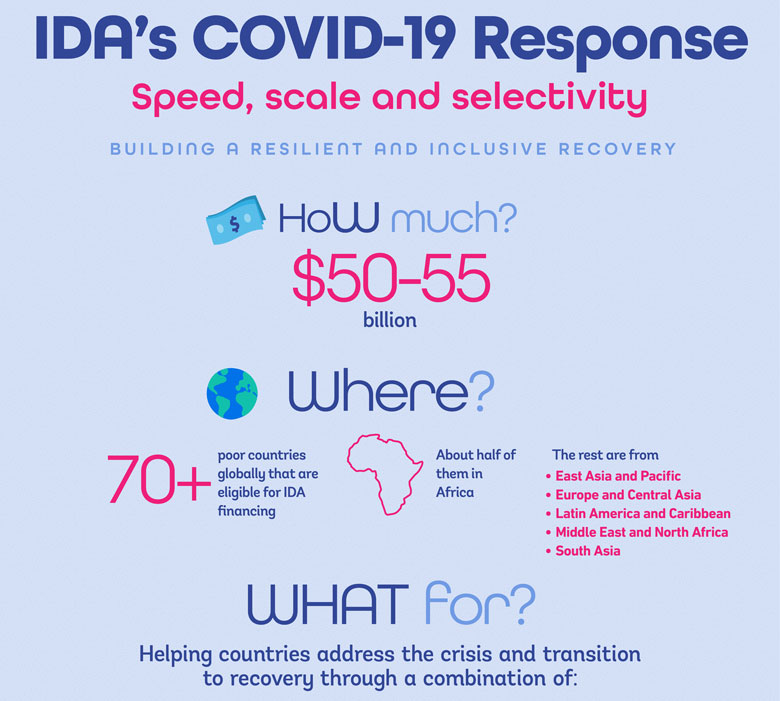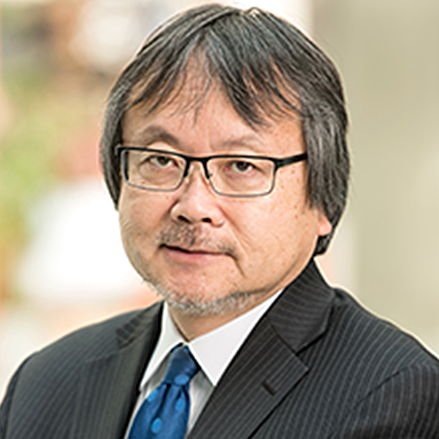Food insecurity: Addressing the compounding impact of COVID-19
At the end of 2020, 233 million people in IDA countries were experiencing food insecurity, and that number is expected to rise in 2021 and 2022.
During the 2008 food crisis, IDA was front and center, fast-tracking assistance through the Global Food Crisis Response Program (GFRP). Between 2008 and 2012, the program reached 57.3 million people, including support for social protection programs and agricultural interventions.
Now, IDA’s COVID-19 food security response—$5.3 billion in new commitments—is once again focused on both the today and the long term. About half of these commitments will fund longer-term investments in resilience, in line with IDA’s stepped-up focus on the underlying drivers like conflict, climate and zoonotic diseases. Projects have an ongoing focus on those who are caught in the crosshairs of the pandemic: women, children, refugees, people with disabilities and other vulnerable populations.
Climate: Managing natural resources to build back better
As the frequency and impact of zoonotic disease outbreaks like COVID-19—infectious diseases transmitted from animals to humans—has increased over the past two decades, IDA is working closely with countries to support their efforts to better conserve and sustainably manage biodiversity.
“We want the Mecuburi Forest Reserve to be green again, to produce water and other environmental services for our livelihoods—as it used to be at the time of our forefathers,” said Felismino Manhica, a local leader from the Mecuburi District in Mozambique.
Manhica is one of 40 community leaders who completed training on identifying restoration opportunities and selecting feasible interventions, thanks to the IDA-funded Mozambique Conservation Areas for Biodiversity and Development Project. The restoration of degraded land is a priority for Mozambique—a country endowed with more than 32 million hectares of natural forest that are home to 6,000 plants, birds, and mammal species. IDA's support is protecting habitats while improving the lives of 20,000 people, almost half of which are women, around the national parks by providing alternative income-generating activities.
In some parts of the Sahel region—notably in Burkina Faso, Chad, Mali, Mauritania, Niger and Senegal—climate change is compounding the human and economic toll of COVID-19. Rainy seasons are growing shorter and the dry seasons are longer, sometimes lasting up to nine months. The drought in 2010 was particularly arduous. With temperatures in the Sahel increasing 1.5 times faster than the global average, these countries face increased water scarcity, reducing crop yields and livestock productivity, and affecting food security and food prices. That’s why IDA is investing in programs to scale up support to restore degraded land, boost agriculture productivity, and enhance water security to build climate-resilient food systems and sustainable landscapes.
As the stories of Mozambique and the Sahel illustrate, it is imperative to act now on climate. Protecting natural ecosystems and biodiversity and addressing the impacts of climate change are a critical part of the blueprint, as countries embark on a green, inclusive and resilient recovery.
The end goal: Position communities on the path to a resilient recovery
For people like Dr. Barreto, Dr. Sall, Kamala, and Felismino, IDA’s continued support for resilient health systems, social safety nets, sustainability, food security, and economic transformation is evident as they attempt to weather the impact of this pandemic. With hope on the horizon and as countries begin to look to recovery, IDA will continue to be a steadfast partner—bringing together global partners to enable countries to rebuild in resilient, inclusive, and sustainable ways that leave no one behind.
IDA Countries benefiting from the dedicated COVID-19 Fast-Track Facility (as of February 11, 2021)

Disclaimer: The boundaries, colors, denominations and any other information shown on this map do not imply, on the part of The World Bank Group, any judgment on the legal status of any territory, or any endorsement or acceptance of such boundaries.
For more information about the World Bank Group’s operational response to COVID-19, view the projects list here.


 View full infographic:
View full infographic: 
